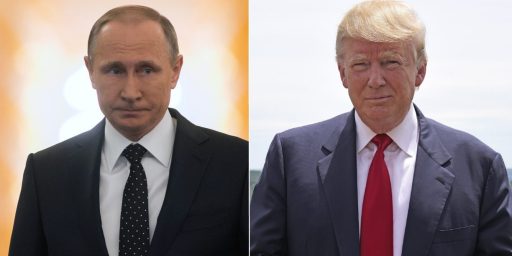If This Samantha Power Video Is The Next “Big Controversy”, Will It Be The Right Controversy?
Some thoughts on a decade old video in which Samantha Power speculates on actions to take against an unfolding genocide.
This morning, the Washington Post’s Max Fisher wrote about a decade-old video of Samantha Power, President Obama’s current nomination for U.S. ambassador to the United Nations, that is once again beginning to make the rounds in political circles. The 3 minute clip comes from a 2002 interview on Conversations with History a public access TV program hosted by University of California professor Harry Kreisler. At the time Power was the executive director of Harvard University’s Carr Center for Human Rights Policy. In the clip, as part a discussion of the ongoing Israeli-Palestinian conflict, of Kreisler poses a hypothetical question to Power about genocide and intervention:
Kreisler: Let me give you a thought experiment here without asking you to address the Palestine-Israel problem. Let’s say you were an adviser to the president of the United States. How would, in response to current events, would you advise him to put a structure in place to monitor that situation, lest one party or another be looking like they might be moving toward genocide?Power: Well I don’t think that in any of the cases a shortage of information is the problem. And I actually think in the Palestine Israeli situation there’s an abundance of information. And what we don’t need is some kind of early warning mechanism there.
What we need is a willingness to actually putting something on the line in terms of helping the situation. And putting something on the line might mean alienating a domestic constituency of tremendous political and financial import. It may mean, more crucially, sacrificing, or investing I think more than sacrificing, literally billions of dollars, not in servicing Israel’s military but actually investing in the new state of Palestine; in investing billions of dollars it would probably take also to support I think what will have to be a mammoth a protection force — not of the old Srebrenica kind or of the Rwanda kind, but a meaningful military presence.
Because it seems to me at this stage — and this is true of actual genocides as well and not just major human rights abuses which we’re seeing there — that is that you have to go in as if you’re serious, you have to put something on the line.
And unfortunately — imposition of a solution on unwilling parties is dreadful, I mean it’s a terrible thing to do, it’s fundamentally undemocratic — but sadly… you know, we don’t just have a democracy here either, we have a liberal democracy, there are certain sets of principles that guide our policy, or they are meant to anyway, and there it’s essential that some set of principles becomes the benchmark, rather than a deference to people who are fundamentally, politically destined to destroy the lives of their own people.
And by that I mean what Tom Friedman has called ‘Sharafat’ — I mean I do think in that sense that both political leaders have been dreadfully irresponsible — and unfortunately it does require external intervention, which, very much like the Rwanda scenario, — that thought experiment: if we had intervened early — any intervention is going to come under fierce criticism, but we have to think about lesser evils, especially when the human costs are becoming ever-more pronounced.
[Core Transcript originally found at the New York Times. I added additional transcription — the question and the first paragraph of Power’s response.]
Fisher notes that this is not the first time this clip has come back to haunt Powers. In 2008 she publicly disowned the comments in an interview with MIFTAH, a pro-Palestine sovereignty website. Fisher points out Power also distanced herself from this statement in 2011 interview with a pro-Isreal Rabbi. However, given the difficulties Chuck Hagel faced during his appointment hearings, chances are Powers will be asked by Senators to once again account for this video.
And while there is nothing wrong with such questioning, I suspect, based on what happened to Hagel, that most of the focus on this quote will be misplaced. In other words the video will be used to question Power’s “Commitment to Israel” rather than her commitment to interventionism.
Setting aside the red meat issue of Power’s stance on Israel — something that Fisher deals with in his article — I find her justification of military intervention troubling. Again:
Power: And unfortunately — imposition of a solution on unwilling parties is dreadful, I mean it’s a terrible thing to do, it’s fundamentally undemocratic — but sadly… you know, we don’t just have a democracy here either, we have a liberal democracy, there are certain sets of principles that guide our policy, or they are meant to anyway, and there it’s essential that some set of principles becomes the benchmark, rather than a deference to people who are fundamentally, politically destined to destroy the lives of their own people.
Power is saying that we have no choice but to intervene in the case of probable genocide if we wish to stay true to our liberal democratic values.
This stance immediately triggers a two thoughts:
First, while many conservative commentators have questioned President Obama’s commitment to American Exceptionalism, it seems to me that Power’s statement above is a profound realization of the concept. She’s suggesting that our our liberal democratic structure — the very foundation of our Exceptionalism — morally compels us to take “fundamentally undemocratic” actions and intervene in the affairs of other nations. Let that marinate for a moment or two…
Secondly, taking a long view, its difficult to see where Power’s views on intervention end and Neoconservative foreign policy begins. Both, as far as I can tell, are based on radical intervention and ultimately the transformation of foreign states through the imposition of liberal democratic values (i.e. American Exceptionalism). And both frame their arguments for said interventions in fundamentally moral/existential terms.
Regardless of how she now feels on the subject, Power’s nomination offers a moment to have a real discussion on the question and costs of intervention. It seems to me this is a valuable conversation to be had. Unfortunately, the cynic in me suspects that other things — in particular the Israeli-Palestinian context of the quote — will prevent that conversation from ever seriously taking place.
—
Side Note: I’m interested to see whether or not this video will actually generate much serious controversy. One thing that it has working against it is how convoluted it is — both in terms of the question and the response. As a result, it doesn’t provide any soundbites of note. In other words, its not media friendly. Contrast this to Hagel, who provided far more quotable quotes.






I’m not a fan of Ms. Power. She probably believes she’s really trying to do good in the world. Trouble is, it’s awfully easy for her to talk about “we” putting something on the line. She won’t be on the line, and her share of paying for it will be minimal, and if it all ends in tears she’ll be the gal with her heart in the right place…
Now it could be that my strong reaction to our 21st century wars is clouding my judgment, but I don’t think so. I recall opposing our intervention in Kosovo back when I was in highschool. I was never sure, exactly, what we were supposed to have done in Rwanda.
I’m a fan of liberal democracy. I’m also a fairly Liberal Democrat. 😉 I do not believe it therefore follows that I must support military interventions in other countries to (supposedly) further liberal democratic principles.
There are several reasons for this.
#1 – This is the big one: I think there is a fundamental moral difference between monkeying around in your own country via laws passed by a duly elected representative government (e.g., Social Security or the ACA) and monkeying around in some other country, to whose voters (if they vote at all) you are not responsible. There is also a practical aspect: while we can always go on about how those idiots in DC don’t understand [insert locality here], it’s much more true that they don’t understand a foreign country.
#2 – In keeping with the whole “we don’t really know what we’re doing” theme, there is this apparent idea that democracy = liberal democracy (Powers may not suffer from this delusion). This is being illustrated in Egypt. The “secularists” teamed up with the military to bring down a democratically elected Islamist government. Pick the good guys there. Better yet, forget good/evil, and pick the path more likely to result, at some point in the future, in liberal democracy. I could argue either side.
#3 – I hold this view much more weakly than I do #1 and #2, but I have this nagging sense that an outsider coming in to break up a fight is likely to merely delay it. At the risk of a possibly terrible analogy – how many altercations in school are broken up and “solved” by having the two kids shake hands. How many of those situations end in a fight anyway?
Samatha Power’s R2P is a dangerous business. The liberal interventionists are only slighly less scary to me than the neocons (slightly less so b/c they tend to be multilateralists and this can result in folks coming to their senses. Alternatively, it can result in getting sucked into something we don’t really have an business in – ala Libya).
@Rob in CT:
I find them both equally scary because of the fundamentally moral urgency of their arguments. Both groups put belief above on-the-ground facts. I suspect the only reason that the liberal interventionists seem better is because their manner of operation is more in keeping with your world view.
I also find it somewhat telling that both movements largely emerged at the same time.
Matt – I’m open to the possibility. I had considered it was just affinity: I now self-iD as liberal, therefore… but that doesn’t work, because back in the 90s when I would never have identified that way, I still found them slightly cuddlier than uberhawks (I wasn’t aware of “neocons” but there was definitely a “bomb everything” group). I think worldview is a possible explanation, but I have another theory:
I think the liberal interventionists have simply “achieved” less. Of course, past performance is no guarantee of future results…
@Rob in CT:
Which is to say that two ideologies can be equally scary, but one can simply have done more in the world. To date.
I would much prefer to not find out if liberal interventionists can cause as much havoc as the neocons.
@Rob in CT:
Weren’t the “best and brightest” that got us into Vietnam to in the 60s part of one school of liberal interventionism?
And, yes, I realize that Vietnam occurring in the context of the Cold War complicates the comparison.
@Rob in CT: Power is brilliant and likable, at least if you’re an intellectual. I, however, wouldn’t want to put her in charge of setting US foreign policy. Thankfully, she won’t be; the UN ambassador just represents the president’s views at Turtle Bay (and, of course, runs our diplomatic outpost in Benghazi).
@Matt Bernius: Yeah, they’re peas in the same pod. Basically, two ways of doing the same thing. And, yes, they’re both answers to What Now? that emerged after the collapse of the Soviet Union.
@Doug Mataconis:
You know… I’m going to be honest and admit I don’t know enough about FP terminology to answer that question. If the answer is yes, then the liberal interventionists have done more than the neocons! Vietnam > Iraq.
@James Joyner:
Right, Obama sets policy. He definitely likes Power, though, yes? It’s not appointing Power to this position that I care about. It’s more that O is fascinated by her ideas and subscribes to her newsletter. 😉
@James Joyner:
Important point. We survived John Bolton as UN Ambassador.
Other the other hand, this article really isn’t about whether or not Samantha Power is qualified for the position (there’s no doubt she is). Or if her “right to protect” views disqualify her for the position (they don’t). It’s more that — for better or worse — Senate appointment hearings have become moments for public discussion of a variety of value based topics. And I think there’s an important conversation to be had about appointments. And this video could be a catalyst for it. I just think that it won’t be, for reasons I touch on above.
Don’t you think it goes a subtle, but important step past this. It’s not just “what do we do after the collapse of the Soviet Union,” but “what can we do now that we’ve won the Cold War.”
I think the winning part (whether you believe its factually true or not) is critical as it helps provide the moral energy to animate both moments.
@Doug Mataconis:
Actually I think that Vietnam remains a critical part of the broader discussion on Interventionism (along with Korea and pretty much every military action during the Cold War). Because, while the Cold War was animated primarily by the national security concerns that gave way to the Neoconservatives, there was still an undercurrent of the more “liberal” concerns in most of the actions.
Samantha Power wrote this article about how America sat by while 800,000 Tutsis were hacked to death in Rwanda in the space of 100 days. I have no doubt her thought process was strongly influenced by what she learned during the three years of investigation and research that went into writing it. I also have no doubt she would be a very strong voice for intervention, should something similar happen during her tenure.
One link and it went into purgatory? Pleeeeeease release me, let me goooooo….
@Mikey:
The issue that I have is why we would expect that the long term effects (not to mention cost) of stopping state sponsored genocide in Rwanda would turn out any better than the long term effects of acting to stop state sponsored terrorism in Afghanistan or Iraq?
When push comes to shove, the only way to stop these actions is to disassemble the state that enabled the atrocities to occur. And that moves us away from policing and towards colonizing.
And to that point, there was always a liberal argument helping to legitimize European colonization of the rest of the world.
If we’re including Vietnam in discussions of R2P let’s also include Rwanda, Cambodia, Syria and the Holocaust as useful points of discussion.
I believe in R2P. I do not believe we should allow it to force our hands. Our responsibility has to be tempered by an assessment of the means available to us, the likelihood of success, and other factors. I don’t believe it’s as simple as saying, “Bad stuff happening, let’s saddle up!” Nor is it as simple as saying, “Hands off foreigners.”
We have to take it on a case by case basis.
As for Ms. Power, I can’t say I care. She works for the POTUS and if he wants her in the job, fine by me. Bolton was a jackass but he worked for a bigger jackass, and given that in the end the responsibility is on the President it should be his call.
Vietnam was seen as a domino that was going to turn all of the other adjacent countries communist, or at least that was the thinking at the time being pushed by people like McGeorge Bundy. I’m not sure you can classify “not going commie” as liberal interventionism.
@NickTamere:
No not that aspect — which by the way was the same general theory Neoconservatives had about Iraq.
However, if you look at the rhetoric around Vietnam and similar interventions, a key selling point for getting us further embroiled were the atrocities being committed by the godless Commies against the good people of Vietnam.
Let’s move on. This “controversy” is the product of two fundamental errors in constructing an the argument: the unlikely hypothetical and the slippery slope.
Let’s test this against reality: When has the USA ever intervened unilaterally to stop a genocide?
That’s right, zero times. Ain’t gonna happen, and especially not under this President.
It is far more likely that the USA will stand aside and let a genocide happen, that that it would unilaterally intervene, even now.
Now something may happen that might involve multilateral action, under the auspices of the UN and NATO, but this is an an unlikely event, and even then, the American people through Congress has the ultimate power to stop that.
@Matt Bernius:
Well, we didn’t colonize the former Yugoslavia, or even Iraq and Afghanistan, although the last would probably be better off if we had. We took apart Germany and Japan and rebuilt them without colonization, although we based tens of thousands of troops in the former for decades. So there’s no doubt even without colonization, we should assume an intervention would very likely lead to a long-term commitment of resources.
But standing by while 8,000 people were horribly murdered every day for three and a half months? I just don’t know how we could do that. Was there nothing we could have done to stop it?
@michael reynolds:
Agree , and add:
I do think that R2P is sort of a boogeyman for non-interventionists who, every time it’s mentioned, jump up and run around saying “Omigod, this doctrine will force us to engage in costly interventions all over the world, for goody two-shoes,useless, humanitarian reasons.”
Of course when you look at how the USA actually does its foreign policy, you see how unlikely this all is. 99 per cent of all US intervention abroad is to promote US interests, even when its cloaked in humanitarian terms. See, for example , the Mexican-American War.
Foreigners understand this, even if some Americans are confused about it.
@Mikey:
That article simultaneously made me feel terrible and reinforced a number of my reservations about military interventions.
As Matt points out, at least with respect to Rwanda, “success” would absolutely have required invading, defeating the government, and at least temporarily ruling the country. The government was behind the genocide.
@stonetools:
Some of us think R2P is dangerous, in part, because it helps bolster those dishonest justifications for interventions. When the Bushies were throwing anything at the wall hoping something would stick, they brought out the ‘ole humanitarian concern argument. And what happened? Liberal interventionists were sucked into it!
@Mikey:
In terms of Afghanistan, I suspect that things would have gone in much the same way if Gore was president. I don’t see anyway that could have been realistically handled without displacing the Taliban.
As far as your broader point, while we didn’t colonize these countries in the pre-WWII sense, the fact is that both are examples of, for lack of a better term, soft colonization. For example, in both cases the only option available was the implementation of western style liberal democracies.
I’m not saying its the same as what the British, Spanish, French, Portuguese or Dutch did. But the fact is that we had to rebuild the countries and reshape their governments. The process happened faster than colonization, but there’s plenty of evidence to suggest that the natives appreciated it just about as much this time as they did the last time.
And additionally, even after we have left these countries, I suspect that we will find that our futures are bound together for quite some time.
@Rob in CT:
Then the solution is not to demonize R2P ( who 99.00 per cent of Americans have never heard of anyway) but to debunk dishonest uses of it.
In any case, R2P wasn’t the main engine on Iraq War intervention- WMD was.
@Matt Bernius:
There are (IMO) no “givens” in this kind of thing. Every situation is different. Case in point: We thought the only way to stop “it” from repeating in Somalia was to take out Adid. We failed, but he didn’t try to do that again.
In Rwanda, it was a case (again, IMO) of the peoples only source of information being a propaganda station, and from there a temporary case of mass hysteria. She isn’t the only one that believes that was a “stitch in time” situation.
I don’t see much evidence we are good at spotting the ones where it’s worth it and where it’s not, so please don’t get me wrong here.
@Matt Bernius: Agreed, but it seems that in order to get buy-in for modern wars they can’t come out and say that it’s about hegemony, it’s about helping the kurds/kuwaiti infants/south vietnamese/et al. Not that the two are mutually exclusive.
@NickTamere:
Agreed, but this also get to the a larger point that, when taking a broader view, the differences between the Neoconservatives and Liberal Interventionalists start to breakdown.
@Rob in CT:
As Matt points out, at least with respect to Rwanda, “success” would absolutely have required invading, defeating the government, and at least temporarily ruling the country. The government was behind the genocide.
It would have been multilateral, and worth it. Its not like we would have wanted to stay. It’s Rwanda.
Why do we have a responsibility to stop genocide if we can? Because we can.
This is just side entertainment, but this guy does it so damn right. Hang in there for the back-lit zombie-walk at 2:40 or so.
http://www.youtube.com/watch?v=bVlAtMZAzeY
@stonetools:
Yes, it’s true that R2P didn’t drive the Iraq War. No doubt.
I still think it’s dangerous. On this, we’re just going to disagree.
Mantis:
Who is this we, exactly? The United States government exists to safeguard & improve the life of United States citizens (and legal residents). That’s it’s purpose. The United Nations, in theory, exists to do more, including such things as peacekeeping. But we all know that UN is really heavily dependent on the US government when it comes to peacekeeping (for logistical reasons, if nothing else).
Rwanda happens to be an extreme case. Faced with “another Rwanda” (to the extent I *realized* it was another Rwanda in real time), I might break with my general approach. Theory doesn’t always survive contact with Reality. There are exceptions. But man, I want that bar set high.
I would much rather we work on perfecting our Union, setting an example for others to follow, and taking in folks who need refuge.
I really don’t buy this.
There is history there of Tutsi vs. Hutu, that goes back decades. Further, there was an active civil war and mass killings (tens of thousands instead of hundreds of thousands) earlier in the 90s. That was still simmering. The genocide didn’t come out of nowhere. The other theory I’ve read is that the ethnic hatred meshed with an even more banal desire: hey, that Tutsi’s got a nice piece of land… I’d rather like that piece of land.
So even if the USA, via the UN had gone in guns blazing, kicked the everloving sh*t out of the Hutu-led army & militiamen and restored some semblence of order, I have no faith that it wouldn’t boil over again down the road.
That said, it may have still been worth doing. Rwanda really is an extreme case – one where the case for R2P is particularly strong. Most events are not like that.
@Rob in CT:
I wouldn’t buy it if somebody tried to tell me there had been no underlying strife either.
You asserted that it was a case of “temporary mass hysteria.” You pointed to the radio station in particular. This sounds to me like you think that if “we” (US, UN multinational force, whatever) had intervened, the “stitch in time” would have passed and there would have been no genocide-level event.
I’m don’t buy that. If I’ve misunderstood you, feel free to clear up my misconception.
@Rob in CT:
I think it’s quite likely. The people had been subjected to a lengthy propaganda campaign and then told the Tutsi were about to attack them. The huge numbers of machete’s which had been stock-piled for the occasion were distributed. Deliberate manipulation.
In that condition it’s entirely plausible that a cooling off period might have resulted in far less carnage than what in fact took place.
@Dazedandconfused:
But the fact that the existing government allowed (if not supported)
(A) – a lengthy propaganda campaign
(b) – machetes being stock-piled
(c) – the propaganda broadcasts that triggered the ethnic cleansing
I find it difficult to see how to (a) stop the genocide and (b) ensure it doesn’t start up again without an overthrow of the existing system. Especially after an invasion of the country to stop the genocide from taking place.
That’s the challenge. And I don’t see how a multi-lateral situation solves that problem. The fact is there most likely needed to be an extended occupation to ensure that the conditions didn’t immediately start up again.
Regardless of the reason, invasion tends to break countries and government, and if we break it, we buy it.
The assessment at the time was just a single MEU could have done it by blocking some key roads and isolating some people. That’s about 2,000 Marines with air support. There were very few fire-arms in the place. The plan to take the radio station was simple, as they hadn’t even bothered to defend or re-enforce it. As best we could tell, there were two guys guarding the door and and that was it. The US was not hated, but very respected there. Note our foolish ambassador walked out with little trouble.
With the radio station telling everyone to settle the heck down…
It’s not for nothing Clinton calls it the greatest mistake he ever made.
@Dazedandconfused:
Perhaps that would have been the case, however I’m always skeptical at the promise of a clean “one and done” intervention on foreign soil that involves our troop essentially invading part of a country.
I still question how one can stop a genocide without dismantling the infrastructure that enabled the genocide to happen in the first place. This wasn’t just about a radio station.
Let’s face it, previous military actions have been sold on how “easy” they would be. It recently took us 8 years to get out of one of those “easy” actions.
We darn well should be skeptical, but I’m quite certain that if we hold the standard of 100% assurance of easy quick and clean we can never do anything resembling war. Maybe some disaster relief. Maybe.
Sometimes it doesn’t take a lot of nation building. There are a lot of stories of the survivors forgiving the very people who hacked them with machete’s in there. They know it was bullshit, their attackers were deluded.